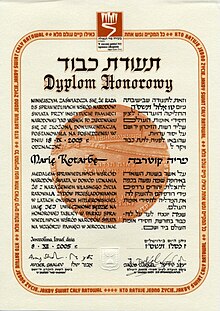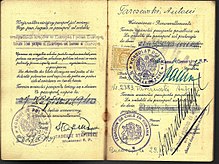Righteous Among the Nations
| Righteous Among the Nations |
|---|
 |
| By country |
Righteous Among the Nations (Template:Lang-he-n, khasidei umót ha'olám "righteous (plural) of the world's nations") is an honorific used by the State of Israel to describe non-Jews who risked their lives during the Holocaust to save Jews from extermination by the Nazis. The term originates with the concept of "righteous gentiles", a term used in rabbinic Judaism to refer to non-Jews, called ger toshav, who abide by the Seven Laws of Noah.
Bestowing
When Yad Vashem, the Shoah Martyrs' and Heroes' Remembrance Authority, was established in 1953 by the Knesset, one of its tasks was to commemorate the "Righteous Among the Nations". The Righteous were defined as non-Jews who risked their lives to save Jews during the Holocaust.
Since 1963, a commission headed by a justice of the Supreme Court of Israel has been charged with the duty of awarding the honorary title "Righteous Among the Nations". Guided in its work by certain criteria, the commission meticulously studies all documentation including evidence by survivors and other eyewitnesses, evaluates the historical circumstances and the element of risk to the rescuer, and then decides if the case meets the criteria. Those criteria are:[1]
- Only a Jewish party can put a nomination forward
- Helping a family member, or helping a Jewish person who converted to Christianity is not a criterion for recognition;
- Assistance has to be repeated or substantial
- Assistance has to be given without any financial gain expected in return (although covering expenses such as food is acceptable)
The award has been given without regard to the social rank of the helper. It has been given to royalty such as Princess Alice of Battenberg, Queen Mother Helen of Romania and Queen Elisabeth of Belgium but also to others like the philosopher Jacques Ellul and to Amsterdam department store employee Hendrika Gerritsen.[2][3]


A person who is recognized as Righteous for having taken risks to help Jews during the Holocaust is awarded a medal in their name, a certificate of honor, and the privilege of having the name added to those on the Wall of Honor in the Garden of the Righteous at Yad Vashem in Jerusalem (the last is in lieu of a tree planting, which was discontinued for lack of space). The awards are distributed to the rescuers or their next-of-kin during ceremonies in Israel, or in their countries of residence through the offices of Israel's diplomatic representatives. These ceremonies are attended by local government representatives and are given wide media coverage.
The Yad Vashem Law authorizes Yad Vashem "to confer honorary citizenship upon the Righteous Among the Nations, and if they have died, the commemorative citizenship of the State of Israel, in recognition of their actions". Anyone who has been recognized as "Righteous" is entitled to apply to Yad Vashem for the certificate. If the person is no longer alive, their next of kin is entitled to request that commemorative citizenship be conferred on the Righteous who has died.

In total, 28,217 (as of 1 January 2022[update])[4] men and women from 51 countries have been recognized,[4] amounting to more than 10,000 authenticated rescue stories. Yad Vashem's policy is to pursue the program for as long as petitions for this title are received and are supported by evidence that meets the criteria.[5]
Recipients who choose to live in the State of Israel are entitled to a pension equal to the average national wage and free health care, as well as assistance with housing and nursing care.
Righteous settled in Israel
At least 130 Righteous Gentiles have settled in Israel. They were welcomed by Israeli authorities, and were granted citizenship. In the mid-1980s, they became entitled to special pensions. Some of them settled in British Mandatory Palestine before Israel's establishment shortly after World War II, or in the early years of the new state of Israel, while others came later. Those who came earlier often spoke fluent Hebrew and have integrated into Israeli society.[6]
Other signs of veneration

The Righteous are honored with a feast day on the liturgical calendar of the Episcopal Church in the United States on 16 July. A Righteous from Italy, Edward Focherini, was beatified by the Catholic Church on 15 June 2013.[7]



In 2015, Lithuania's first street sign honoring a Righteous Among the Nations was unveiled in Vilnius.[8] The street is named Simaites Street, after Ona Šimaitė, a Vilnius University librarian who helped and rescued Jewish people in the Vilna Ghetto.[8]
Number of awards by country
As of June 16, 2017[update], the award has been made to 26,513 people.[4]
| Rank | Country | Number of awards |
|---|---|---|
| 1 | 6,706 | |
| 2 | 5,595 | |
| 3 | 3,995 | |
| 4 | 2,573 | |
| 5 | 1,731 | |
| 6 | 891 | |
| 7 | 844 | |
| 8 | 682 | |
| 9 | 641 | |
| 10 | 601 | |
| 11 | 572 | |
| 12 | 335 | |
| 13 | 204 | |
| 14 | 136 | |
| 15 | 135 | |
| 16 | 116 | |
| 17 | 115 | |
| 18 | 109 | |
| 19 | 79 | |
| 20 | 75 | |
| 21 | 67 | |
| 22 | 60 | |
| 23 | 49 | |
| 24 | 43 | |
| 25 | 24 | |
| 26 | 22 | |
| 28 | 20 | |
| 29 | 10 | |
| 31 | 10 | |
| 32 | 9 | |
| 33 | 5 | |
| 34 | 3 | |
| 37 | 2 | |
| 41 | 1 |
See also
- Individuals and groups assisting Jews during the Holocaust
- List of Righteous Among the Nations by country
- Righteousness
- Virtuous pagan
- Żegota
References
- ^ Gunnar S. Paulsson, "The Rescue of Jews by Non-Jews in Nazi-Occupied Poland", The Journal of Holocaust Education, volume 7, nos. 1 & 2 (summer/autumn 1998): pp. 19–44. Reprinted in "Collective Rescue Efforts of the Poles", p. 256.
- ^ Gerritsen, Hendrika Jacoba (Heinsius), in The Righteous Among the Nations. Jerusalem: Yad Vashem, retrieved online 6 April 2018.
- ^ "Familieberichten" [Family notices]. Het Parool. 28 December 1990. Retrieved 13 April 2018 – via Delpher.
- ^ a b c "About the Righteous: Statistics". Names of Righteous by Country. Yad Vashem The Holocaust Martyrs' and Heroes' Remembrance Authority. 1 January 2022. Retrieved 6 April 2024.
- ^ "First Arab Nominated for Holocaust Honor". Associated Press. 30 January 2007. Retrieved 1 February 2007.
- ^ "Story in ''The Forward'' re Righteous Gentiles who settled in Israel". Forward.com. Retrieved 6 September 2013.
- ^ "Odoardo Focherini: Late journalist, hero and Blessed of the Catholic Church". Rome Reports. Retrieved 19 June 2013.
- ^ a b "Lithuania's first street honoring Holocaust Righteous unveiled in Vilnius | Jewish Telegraphic Agency". Jta.org. 25 September 2015. Retrieved 26 September 2015.
Bibliography
- The Heart Has Reasons: Holocaust Rescuers and Their Stories of Courage, Mark Klempner, ISBN 0-8298-1699-2, The Pilgrim Press.
- Righteous Gentiles of the Holocaust: Genocide and Moral Obligation, David P. Gushee, ISBN 1-55778-821-9, Paragon House Publishers.
- The Lexicon of the Righteous Among the Nations, Yad Vashem, Jerusalem. (volumes: Poland, France, Netherlands, Belgium, Europe I, Europe II).
- To Save a Life: Stories of Holocaust Rescue, Land-Weber, Ellen, ISBN 0-252-02515-6, University of Illinois Press.
- The Seven Laws of Noah, Lichtenstein, Aaron, New York: The Rabbi Jacob Joseph School Press, 1981, ASIN B00071QH6S.
- The Image of the Non-Jew in Judaism, Novak, David, ISBN 0-88946-975-X, New York and Toronto: Edwin Mellen Press, 1983.
- The Path of the Righteous: Gentile Rescuers of Jews During the Holocaust, Paldiel, Mordecai, ISBN 0-88125-376-6, KTAV Publishing House, Inc.
- Among the Righteous: Lost Stories from the Holocaust's Long Reach into Arab Lands, Robert Satloff, Washington Institute for Near East Policy, (PublicAffairs, 2006) ISBN 1-58648-399-4.
- When Light Pierced the Darkness: Christian Rescue of Jews in Nazi-Occupied Poland, Tec, Nechama, ISBN 0-19-505194-7, Oxford University Press.
- Zegota: The Council to Aid Jews in Occupied Poland 1942-1945, Tomaszewski, Irene & Werbowski, Tecia, ISBN 1-896881-15-7, Price-Patterson.
- Tolerance in Judaism: The Medieval and Modern Sources, Zuesse, Evan M., In: The Encyclopaedia of Judaism, edited by Jacob Neusner, A. Avery-Peck, and W.S. Green, Second Edition, ISBN 90-04-14787-X, Leiden: Brill Publishers, 2005, Vol. IV: 2688-2713.
- When Courage Was Stronger Than Fear: Remarkable Stories of Christians Who Saved Jews from the Holocaust by Peter Hellman. 2nd edition, ISBN 1-56924-663-7, Marlowe & Companym, 1999.
- Rescue and Flight: American Relief Workers Who Defied the Nazis, Subak, Susan Elisabeth, University of Nebraska Press, 342 pp., 2010.
- Ugo G. Pacifici Noja e Silvia Pacifici Noja, Il cacciatore di giusti: storie di non ebrei che salvarono i figli di Israele dalla Shoah, Cantalupa Torinese, Effatà, 2010, (in Italian), ISBN 978-88-7402-568-8.
- Paul Greveillac, Les fronts clandestins : quinze histoires de Justes (in French), Nicolas Eybalin publishing, 2014 (ISBN 978-2-36665-000-6).
External links
- The Righteous Among the Nations at Yad Vashem. Its online exhibitions include:
- "Polish Righteous – Recalling Forgotten History" (Website portal for the multimedia-based project and its research documentation and presentations). sprawiedliwi.org.pl (in English with a link to the Polish version). Warsaw, Poland: POLIN Museum of the History of Polish Jews. 2016.
{{cite web}}: CS1 maint: unrecognized language (link) - Heroes and Heroines of the Holocaust at the Holocaust Survivors' Network
- Klempner, Mark (2017). "Heart Has Reasons: Holocaust Rescuers and Their Stories of Courage" (Website portal of resources for the book and lectures of the same name, with PDF and audio excerpts). hearthasreasons.com. The site includes extensive lists of articles, books and film/video/DVDs about Holocaust rescuers and related heroes, plus a reading group guide and book excerpts such as:
- Rut Matthijsen: Chemistry of Compassion — the story of a Dutch biochemist and Righteous Gentile
- Photo gallery on righteous gentiles during the Holocaust at the Simon Wiesenthal Center
- Rescuers at the Jewish Virtual Library
- Karoly Szabo - Wallenberg, 1947, 1965: Holocaust Memorial Budapest, testimony from the Jakobovics family
- The Jewish Foundation for the Righteous at JFR.org
- Auschwitz: Inside the Nazi State at the American public television broadcaster PBS
- zyciezazycie.pl, a site commemorating Poles who gave their lives to save Jews
- Gardens of the Righteous Worldwide Committee
- Essay: "Paying the ultimate price"[permanent dead link] by Irena Steinfeldt, The Jerusalem Post, 14 April 2009.[dead link]
- "AJPN - anonymes, Justes et persécutés durant la période nazie dans les communes de France (The Anonymous, Just and Percecuted during the Nazi period in the communes of France)". www.ajpn.org (in French). Bordeaux, France: AJPN. 2008–2016.

